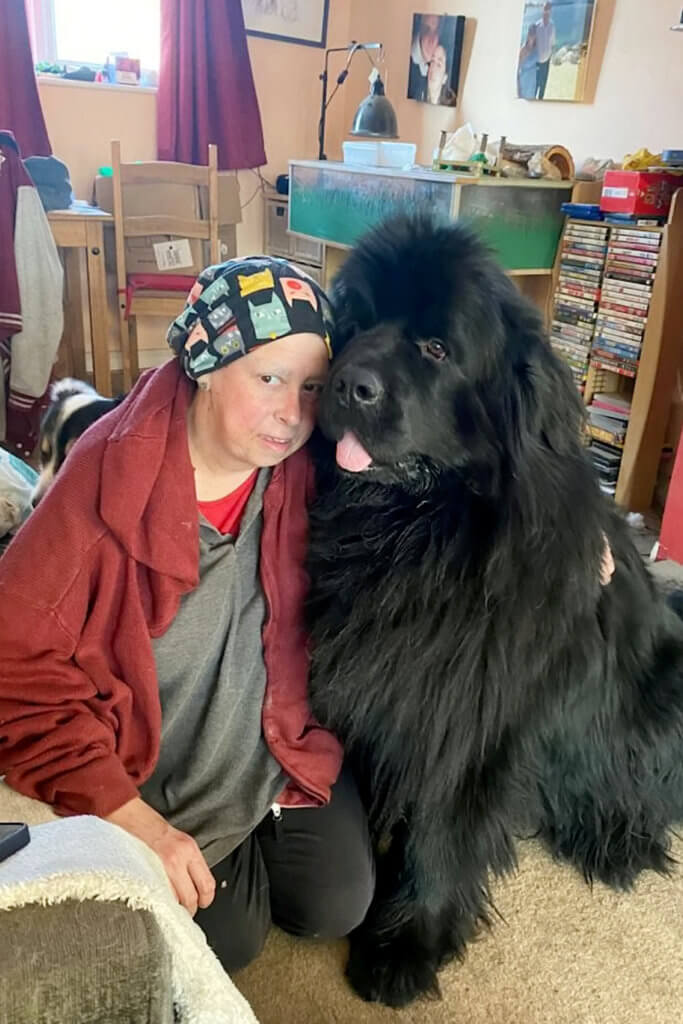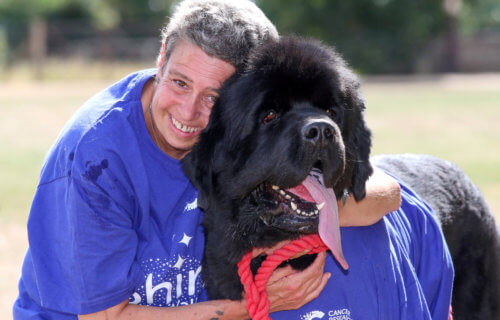LONDON — Recent research shows that dogs can “sniff out” cancer in humans, and one pooch is showing training may not even be necessary. A woman says she owes her life to a rescue dog that “detected” her breast cancer after repeatedly poking at her right armpit.
Lucy Giles, 45, thought her beloved Brody was initially just craving some attention. Now’s she’s crediting her 150-pound Newfoundland giant with discovering a lump in her armpit. The behavior wound up leading to her cancer diagnosis.
The animal-lover had welcomed Brody into her life in July 2021 after her partner Ashley, 62, spent six months in hospital on a life-support machine from contracting COVID-19. When Ashley returned to their home in Oxon, England, he was dependent on Lucy, who works as carer, and she became his full-time support. As part of his recovery, the pair decided to add to the family of pets who they dote on, including two dogs Leo and Murphy, 18 rabbits, two cats and a tortoise.
They then adopted Brody, the gentle giant, who was from a family that could no longer look after him. The Newfoundland breed is well-known for water rescue and lifesaving because of their swimming abilities and intelligence.
“It was in the September that he started to sniff and nuzzle at my right armpit. It was mostly when I was sat down, so either watching TV or sitting down for a rest and always in the same spot on my right side,” recalls Lucy, in an interview per South West News Service. “At first, I thought it was him wanting a bit of fuss and attention but I decided that I should perhaps take notice as it was just my right side he would do this. I was washing myself in the shower one morning and decided to have a feel under my breasts and examine myself and that’s when I felt a lump right there in my armpit.”
Lucy was then informed to wait a month as her doctor thought it could be hormone related, but the lump remained. A few weeks later she was referred to Churchill Hospital in Oxford, England for tests. “The hospital called me one afternoon and asked me to come in and I had no idea what the news would be as they wouldn’t tell me over the phone,” she says. “The consultant said straight away that I had HER2+ breast cancer and there was also residual cancer cells in my lymph nodes. The news hit me hard as it was the same day my nan had died from bowel cancer the year previously and I was with her when she died.”
In October last year, she underwent six rounds of chemotherapy followed by a lumpectomy with radiotherapy afterwards. She is still going through chemotherapy as well as continuing to work full time.

“I have had dark days and OK days,” she adds. “The chemo does make me feel poorly with mouth ulcers and some nose bleeds, but I have a brilliant support network of family and friends who take me to appointments and help in just being there for me, along with Brody of course who perhaps came into our lives for a reason.”
Lucy is now hoping to bring awareness to others by participating in the Cancer Research UK Shine Night Walk, a 10 kilometer stroll to raise money for life-saving research in Oxford.
The incredible ability for dogs to detect disease in humans with their nose is nothing new.
In 2019, Florida health care company BioScentDx tested four beagles that were trained to detect the difference in scent between blood samples from healthy patients and blood samples from patients with lung cancer. While one of the dogs wouldn’t perform the test, the other three correctly identified the lung cancer samples 96.7 percent of the time, and the normal samples 97.5 percent of the time.
BioScentDx also offers a service where their dogs can accurately smell cancer in a person’s breath from a surgical mask sent in by patients. Similarly, dogs have been trained to detect COVID-19 in passengers walking through airports.
Recently, a cat in the United Kingdom was also credited with saving the life of its owner who was suffering from a heart attack. The story along with this one continue to add evidence that pets not only care for their owners’ well-being, but they work to rescue them when in distress.
South West News Service writer Lauren Beavis contributed to this report.
